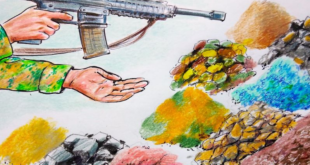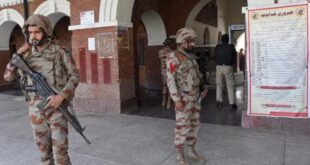The administration of President Joe Biden is reducing US military presence in the Middle East as the country increases the focus of its military forces to confront China and Russia, according to a new report.
The Pentagon is withdrawing at least eight Patriot antimissile batteries from countries including Iraq, Kuwait, Jordan and Saudi Arabia, The Wall Street Journal reported on Friday, quoting Biden administration officials.
The officials added that the Biden administration is also pulling out another antimissile system known as a Terminal High Altitude Area Defense, or Thaad system, from Saudi Arabia, and jet fighter squadrons assigned to the region are being reduced.
The US is also redeploying hundreds of troops who are members of units that operate or support those systems.
The military-related reductions began earlier this month, after US Defense Secretary Lloyd Austin called Saudi Crown Prince Mohammed bin Salman on June 2 and informed him about the changes, officials said. They added that the US is removing most of the military hardware from Saudi Arabia.
The US intensified its military presence in the Middle East region about two years ago amid tensions with Iran. Part of the military hardware was deployed in September 2019 to Saudi Arabia after a series of attacks on Saudi oil facilities.
The Journal report noted that the Pentagon decision shows that Washington now believes that the risk of escalating hostilities between the US and Iran has decreased as the Biden administration pursues talks with Tehran on the revival of a nuclear agreement Washington left in 2018, and has signaled its intention to remove sanctions and return to the 2015 deal.
“What you’re seeing is a realignment of resources with strategic priorities,” said a senior US military official.
“We still maintain tens of thousands of forces in the region, we still have forces in Iraq and Syria, those forces aren’t leaving. We still have our bases in the countries of our (Persian) Gulf partners, they aren’t shutting down, there is still substantial presence, substantial posture in the region,” the official added.
“To the extent that Saudi Arabia has improved its own defensive capabilities, and the United States seeks to resolve tensions with Iran using diplomatic tools, this decision makes sense,” said Kathryn Wheelbarger, former acting assistant secretary of defense during the Trump administration who is now a fellow at the Washington Institute for Near East Policy.
However, a White House official said that some personnel and equipment from Afghanistan are being redeployed to the Middle East to address some of the threats in the region.
The US invaded and occupied Afghanistan in 2001, claiming that the Taliban were harboring al-Qaeda. The invasion removed the Taliban regime from power but prompted widespread militancy and insecurity across the country. The war has taken countless lives, mostly of Afghan civilians.
All foreign troops were supposed to have been withdrawn from Afghanistan by May 1, as part of an agreement that the US had reached with the Taliban in the Qatari capital, Doha, last year. But Biden has pushed that date back to September 11.
 Eurasia Press & News
Eurasia Press & News



